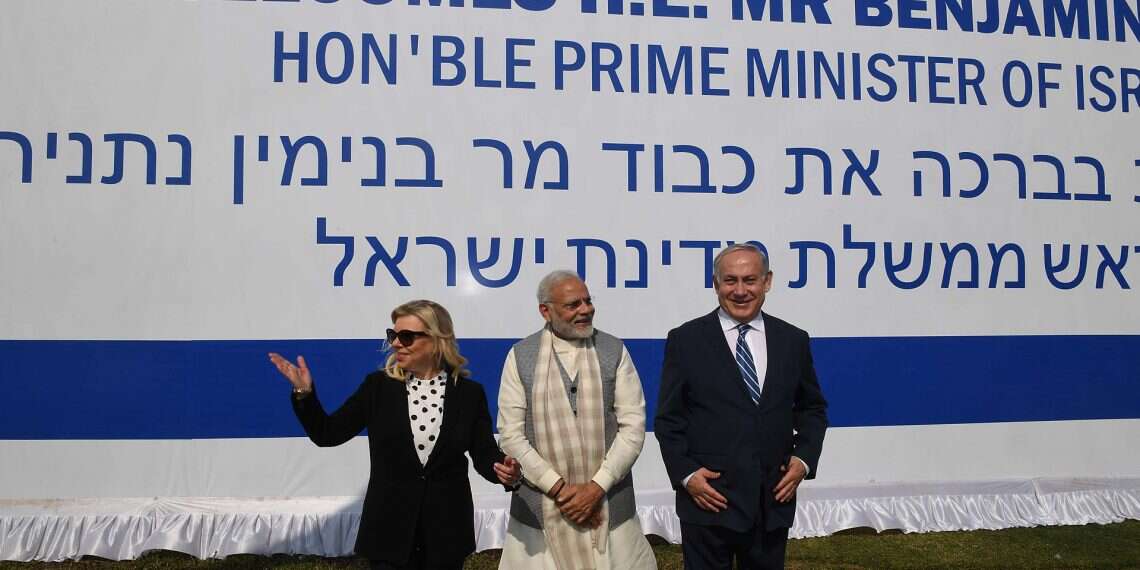by Vijeta Uniyal/JNS
Despite the mainstream media's aversion to India's prime minister on account of his "populist" and nationalist brand of politics, his tenure has been good for business, trade and development and for relations with the Jewish state.
 |
| Prime Minister Benjamin Netanyahu (R) with his wife Sara and Prime Minister of India Narendra Modi | Photo: Avi Ohayon/GPO |
India’s 879 million voters have spoken, and their mandate is resoundingly clear, giving Prime Minister Narendra Modi’s Bharatiya Janata Party and its allies 353 of the 542 seats. It is the first time since 1971 that a single party in India has secured parliamentary majority twice in a row. Modi’s victory sets India on a path of political stability that was not seen since the days of Prime Minister Indira Gandhi.
During his first term in office that began in May 2014, Modi has been credited with taking Israel-India ties to a new level. In 2015, President Pranab Mukherjee became the first Indian head of state to visit Israel. The following year, Israeli President Reuven Rivlin reciprocated by touring India. In July 2017, it was Modi’s turn to write history by visiting Israel – the first-ever by a sitting Indian head of government. In January 2018, Prime Minister Benjamin Netanyahu was in India to mark the 25th anniversary of the establishment of diplomatic relations between the two countries.
Modi, like many Indian business leaders, appreciates the potential that can be unlocked if the two countries work together in the arena of technology and innovation. “We are of one view that together our scientists and researchers would develop, build and implement mutually beneficial solutions,” he said during his visit to Israel.
With Modi at the helm, both countries signed cooperation agreements in areas ranging from rural development to space exploration. Last year, the India-Israel Industrial R&D and Technological Innovation Fund (I4F) was launched to promote joint industrial-research projects. During his tenure, leading Israeli academic institutions, including Tel Aviv University, the Hebrew University of Jerusalem and IDC Herzliya College, have implemented joint projects with prominent Indian universities.
Israel’s agriculture project in India has emerged as the largest engagement of its kind by Israel anywhere in the world. Under the Indo-Israel Agricultural Project (IIAP), MASHAV – Israel’s Agency for International Development Cooperation – operates at least 25 Centers of Excellence across India. The project not only focuses on harvesting conventional crops but also on improving farmers’ income by introducing beekeeping, floriculture and mariculture. In 2018 alone, nearly 150,000 farmers were trained in agriculture best practices by Israeli experts at these centers.
The bilateral trade has risen steadily from $200 million in 1992, when the two countries established diplomatic relations, to more than $5 billion (excluding defense deals) in 2016-17. The commercial interests, once limited to the conventional gemstone sector, have moved over to pharmaceuticals, information technology, telecommunications and homeland security. As part of Modi’s “Make in India” initiative, the government has worked to reduce the country’s dependence on foreign arms-suppliers. Many leading Israeli defense companies, including Israel Aerospace Industries and Rafael, have been encouraged to set up manufacturing units in the country.
Though some of these developments have taken place gradually since the early 1990s and can equally be credited to the previous Israeli and India governments, bilateral ties today bear Modi’s distinct signature. In keeping with his policy to forge a strong bond with the Indian diaspora worldwide, India’s government has made specials effort in reaching out to nearly 85,000 Jews of Indian-origin living in Israel. During his July 2017 visit, Modi addressed a gathering of 8,000 Indian Jews and Indian nationals living in Israel. No modern Indian leader before Modi has managed to galvanize the Indian diaspora in such large numbers.
Despite the mainstream media’s aversion to Modi on account of his “populist” and nationalist brand of politics, his tenure has been good for business. When he first took office five years ago, India ranked 142th out of 189 countries in the World Bank’s Ease of Doing Business index. In 2019, India has jumped to the 77th spot. The political stability offered by Modi’s secure mandate makes India an attractive destination for Israeli investors.
Even though Modi isn’t a populist along the lines of U.S. President Donald Trump, as his detractors in the Western media view him, he isn’t a reformer of a libertarian mold, as many of his admirers in the West consider him. At home, he has been a social conservative, expanding and rebranding welfare programs of his predecessors. Abroad, he has been a firm votary of multilateralism, advocating for free trade and climate action at international fora.
Unlike his predecessors, Modi’s foreign policy has been shaped by his personal relationships with world leaders. If he has been warm toward Trump, Netanyahu and Russian President Vladimir Putin, his dealings with Canadian Prime Minister Justin Trudeau can be described as frosty. Therefore, much rests on the personal rapport between him and the next Israeli premier.
With Modi in office, bilateral ties remain at a historic high. The media speculations over possible hostilities from India’s large Muslim population over Modi’s diplomatic “pivot” towards Israel have largely been unfounded. Beating predictions, he doubled his share of Muslim votes, increasing it from 4% in 2014 to 9% this election cycle. The Arab countries as well haven’t have shown any inclination of punishing India for building stronger ties with the Jewish state. These factors combined with an increased mandate, give Modi even greater leverage in cementing diplomatic ties with Israel compared to his previous term.
This article is reprinted from JNS.org.
Vijeta Uniyal/JNS
Source: https://www.israelhayom.com/2019/06/04/what-modis-re-election-in-india-means-for-israel/
Follow Middle East and Terrorism on Twitter
No comments:
Post a Comment